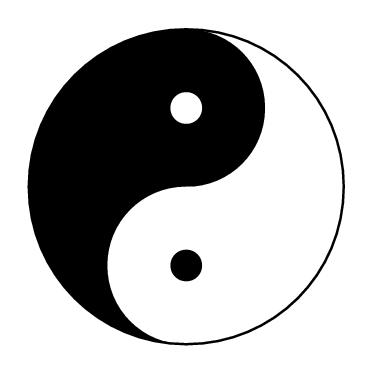How to draw the traditional Taijitu symbol from Chinese philosophy.

Edit and compile if you like:
% Yin and yang
% Author: Thomas G. Kristensen
\documentclass{article}
\usepackage{tikz}
\begin{document}
\begin{tikzpicture}
%color one half of a unit circle
\begin{scope}
\clip (0,0) circle (1cm);
\fill[black] (0cm,1cm) rectangle (-1cm, -1cm);
\end{scope}
%fill heads
\fill[black] (0,0.5) circle (0.5cm);
\fill[white] (0,-0.5) circle (0.5cm);
%fill eyes
\fill[white] (0,0.5) circle (0.1cm);
\fill[black] (0,-0.5) circle (0.1cm);
%outer line
\draw (0,0) circle (1cm);
\end{tikzpicture}
%%% An alternative method suggested by Robert Papanicola
%%% There are unfortunately some visual artifacts due to
%%% the
%%\begin{tikzpicture}
%%%\fill[black, rounded corners=1cm] (0,-1) -- (-1,-1) -- (-1,1) -- (0,1) {
%%% [rounded corners=0.5cm]-- (0.5,1) -- (0.5,0) -- (0,0) -- (-0.5,0)
%%% -- (-0.5,-1) -- (0,-1)} ;
%%\fill[black, rounded corners=0.5cm] (0,-1) -- (-1,-1) -- (-1,1) -- (0,1) {
%% [rounded corners=0.5cm]-- (0.5,1) -- (0.5,0) -- (0,0) -- (-0.5,0)
%% -- (-0.5,-1) -- (0,-1)} ;
%%\draw (0,0) circle (1cm);
%%\draw[fill=white] (0,0.5) circle (0.1cm);
%%\draw[fill=black] (0,-0.5) circle (0.1cm);
%%\end{tikzpicture}
\end{document}
Click to download: yin-and-yang.tex • yin-and-yang.pdf
Open in Overleaf: yin-and-yang.tex


